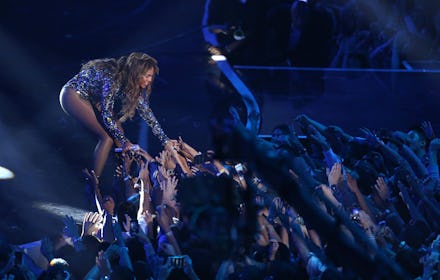No, Listening to Beyoncé Does Not Mean You're Stupid, As This Bogus Chart Suggests

Here's your "science" fix for the day: A software writer named Virgil Griffith is making waves across the Internet this week with a graph that claims to chart human intelligence according to the types of music people listen to.
While flashy and controversial, Griffith's chart ultimately employs a pseudo-scientific methodology that fails to say anything meaningful about intelligence, while inadvertently revealing a lot about longstanding American racial stereotypes.
"Methodology": According to Consequence of Sound, Griffith started by jotting down the average SAT scores of various American universities — a foolproof measure of intelligence if ever there was one:
Then he went on Facebook and determined the most "liked" bands or artists at each of those schools.
Lastly, he put the two together, added numbers and colors, and gave the graph a headline that suggests music is an indicator of your low standardized test results and overall stupidity. The result might be the most unabashedly racist "study" of 2014 (the data was first compiled in 2009, but this latest chart was posted in October).
Bad news for Lil' Wayne fans. Griffith is the first to admit that correlation does not equal causation here, but his findings do illustrate a problematic trend in how we measure smarts.
For one, a distinct pattern emerges at the low end of the graph: The bottom (read: "dumbest") six finishers are all black and Latino artists or genres, ranging from T.I. and Beyoncé to artists specializing in gospel, reggaeton and soca music (an upbeat, calypso-inspired genre popular in Trinidad and Tobago).
Meanwhile, Third Eye Blind, John Mayer and the Shins fall near the middle of the spectrum, because of course they do, while Beethoven — yes, Beethoven is among the most "liked" artists at multiple universities — runs off with the whole contest.
But measuring such a roughly defined trait as intelligence is tricky business. Even traditional IQ tests have come under scrutiny of late, with researchers claiming that more factors need to be considered for anything close to an accurate measurement to be obtained.
What is certain, however, is that tests like the SAT are far from comprehensive. The verbal part of the exam in particular reflects such a racial and cultural bias as to make it a problem the testing industry is "obligated" to study, according to the Harvard Educational Review.
Not to mention its drastic overuse in the college admissions process: Despite being an inadequate predictor of academic success, the SAT continues to be used by many schools to weed out huge swaths of students, especially black and Hispanic applicants, the Huffington Post reports.
Given that these kids are typically funneled into the most overcrowded and underfunded public high schools in the country and subjected to the harshest disciplinary measures, they end up being punished and stigmatized for a set of systemic failures.
The lasting result is a standard of intelligence that too often fails in its attempt to measure intelligence. And it's used to undergird junk science like the "study" presented above, wherein listening to "Partition" too many times is declared a fair predictor of general stupidity.